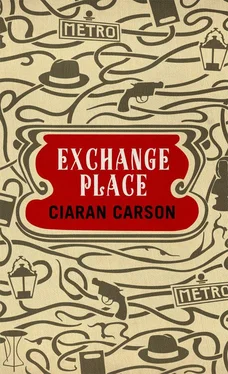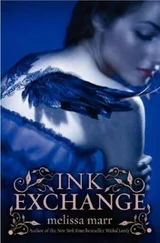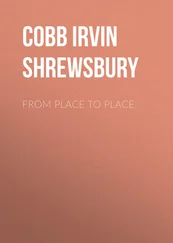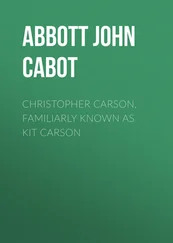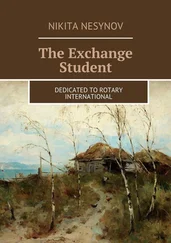That afternoon, at Librairie Jean Tuzot on Rue Saint Sulpice, Kilpatrick bought a book by Patrick Modiano, Rue des boutiques obscures , and leafed through it before buying it, as he knew he would. He had first come across Modiano some time ago and had since bought four of his books from online French booksellers. Though they all seemed to be versions of each other, he was attracted by their fugue-like repetition of themes and imagery, their evocation of a noir Paris in which the protagonists were endlessly in search of their identities. He put the book in his briefcase.
Towards nightfall he was walking vaguely in the direction of the hotel, up Rue du Sentier in the garment district, when the thought of the scarf came to him again, and he pictured himself wearing the paisley silk, seeing it gleam against the soft wool and cashmere of the camel coat. By now it was cold and dark and foggy and the street lamps glowed dimly through the fog, their light shimmering in puddles on the street, and as he pictured himself in the scarf he saw a man walking down the other side of Rue du Sentier. The man was wearing a double-breasted camel overcoat, blue and gold paisley scarf, grey trilby, navy-blue corduroys, tan brogues and burgundy leather gloves. He was carrying a briefcase.
The man in question stopped at a shop window under a streetlamp as if window-shopping. Kilpatrick stopped too. The man turned and looked at Kilpatrick. His face was half-hidden by the brim of his hat. Then, with the gesture of a magician who has come to the end of his stage act, he swept off the hat, made a low bow, and vanished into the darkness beyond the oasis of lamplight. Kilpatrick walked over to the window. There was no-one there. The glass was dusty and the only item on display was a mannequin dressed in the fashion of the Sixties — slim-cut Prince of Wales windowpane check suit, tab-collar shirt and narrow knitted tie, a snap-brim trilby at a tipsy angle on its head. Its arms were thrown out and one leg had buckled under it. It was the kind of shape one might cut in a sixties dance, thought Kilpatrick. The Frug or some such. Several dead flies lay at the mannequin’s feet and Kilpatrick wondered who had last set foot in the place. He looked at the impassive features of the mannequin, and thought of the face he had just seen. Kilpatrick thought of the face of his erstwhile friend John Bourne, who had vanished some years ago, and had not been seen since by anyone of Kilpatrick’s acquaintance. Kilpatrick entered the shop doorway and tried the handle of the door. The door was locked.
As I write, I have notebooks strewn on the desk, on the sofa, on the floor, and I refer to them from time to time, or rather I flit from one to another, skimming, flicking through the pages from back cover to front and back again, foraging for I know not what, a glimmer of a memory, a phrase, a string of words, something jotted down a week, a month, a year ago, that might be germane to this present moment, something that is in my mind or on my mind now as it was then. One of the problems with the notebooks is their fundamental lack of organisation. Some are dated on the cover, others bear a title which might indicate their contents or preoccupations, some are both titled and dated, and some individual items are dated, but many are not. Consequently, although the cover of a notebook might be dated, there is no guarantee that a particular passage will have been written around that time, for in practice I sometimes pick up any notebook that is at hand rather than the current one.
Some entries are neatly written, some are scribbled, some are so scrawled as to be illegible, so that the writing seems the product of several hands, written by different people. Some entries are quotations from other writers, though many have no quotation marks, and sometimes I am uncertain as to whether a particular entry is my own work, or the work of another, or an amalgam of the two. Whatever the case, I like to think of that other work as being written by myself. Indeed, some of the notebooks carry my name, John Kilfeather, on the inside cover, and my address, as a form of security. A proof of my identity. Then again some entries which must have made sense to me at the time of writing make little or no sense to me now. You might say that I am faced with a jigsaw puzzle. But this is not a jigsaw puzzle. There are no straight edges or corners to help with the framing of the picture; and the picture or the story I am trying to piece together does not yet exist.
I open a notebook at random, and come across this: ‘Dublin train 11.00/13.20 JULES VERNE Cocteau 80 days’. The cover of the notebook is dated Dec. 2009, and I now remember what I had forgotten, that I first read Jean Cocteau’s Round the World Again in 80 Days (Mon Premier Voyage) on the Belfast — Dublin Enterprise Express. 11.00/13.20 must refer to the train times, though I cannot remember which train I took, or on what day, or why I made the journey, for the entry is undated. Cocteau was inspired by a stage production, at the Châtelet Theatre, of Jules Verne’s novel, as indicated on the first page of Cocteau’s book. ‘Never for me,’ writes Cocteau, ‘will any real ocean have the glamour of that sheet of green canvas, heaved on the back of the Châtelet stage-hands crawling like caterpillars beneath it, while Phileas and Passepartout from the dismantled hull watch the lights of Liverpool twinkling in the distance.’
In 1936, at the suggestion of his then lover Marcel Khill, Cocteau undertook to duplicate Verne’s adventure, securing financial backing from the evening paper Paris-Soir , to whom he would send a series of instalments along the way. He soon discovered that Phileas Fogg’s journey in 1873 was indeed a fiction, and that even in 1936 it was barely possible. The practical arrangements were made by Khill, whose real name was Mustapha Marcel Khelilou ben Abdelkader, born of an Algerian father and a Norman mother. Throughout Cocteau’s account Khill is referred to as Passepartout, the French for a master key, skeleton key, or picture mount, rather than passport. Khill was also Cocteau’s opium supplier, and one of the features of the book is their constant and frequently rewarded search for opium dens. Much of the book reads like an opium dream.
My notebook contains five pages of notes with page references to Cocteau’s book written with a Muji 0.5mm black ink gel pen written at my table seat on the Enterprise Express. They are followed by a pencilled entry, most likely written at a later date: ‘cf. Notebooks of Robert Frost, p. 89, Every thing that is a thing is out there and there it stands waiting under your eye till some day you notice it, p. 127, The strangeness is all in thinking two things at once, in being in two places at once. That is all there is to metaphor.’ And when I read Cocteau’s book I was indeed in two places at once. I do not know how many times I have been on the Dublin train, but the journey is so familiar to me that were I blindfolded I would have a good idea of where I was at whatever time, at whichever point on the line. Lisburn — Portadown — Newry — Dundalk — Drogheda — Dublin. I might well have been in Lisburn, a nondescript market town, I might have glanced out the window at a row of backyards — washing lines, pigeon lofts, sheds — before writing, ‘8, I owe much to the Rome express’. I stretch my hand up to the bookshelf on the wall above my desk in 41 Elsinore Gardens and take down Cocteau’s book, which has languished there unopened for I do not know how long, open it at page 8, and begin to read these words I now transcribe:
‘I owe much to the Rome express. It cleared my mind of cobwebs, the befuddlement of one who after many years of sleep is woken with a start; it resolved the difficulty I had found in living on my own resources instead of suffering the lot of a somnambulist walking precariously along the edges of a roof … Now at last I was submerged — how marvellous it was! — in simple, human sleep, dense and opaque, broken by lucid intervals when I rose to the surface and saw between my feet the landscape scudding past, framed in the carriage window. Trains play Beethoven symphonies. Memories of their themes float up, and automatically blend into the breathless rhythms of speed. It is as if the deafness from which they sprang were akin to the silence of the railway carriage, a complex silence made up of innumerable noises. The throbbing pulse of blood through its dark metronome of arteries, echoes of triumphal marches, glimpses of nightbound stations and, by day, of white, almost Moorish cities, with minarets, square-built houses and lines of fluttering linen hung along the foreshore of a sea dyed laundry-blue — all compose the intervals of a dream theatre where dramas inexpressible in words are played.’
Читать дальше
